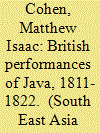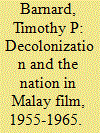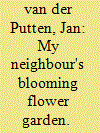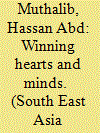| Srl | Item |
| 1 |
ID:
086849


|
|
|
|
|
| Publication |
2009.
|
| Summary/Abstract |
This article looks at the reception of the British interregnum of Java (1811-1816) in the theatre through a comparison of Jane Scott's pantomime The Poison Tree (1811), George Colman the Younger's melodrama The Law of Java (1822) and the case of 'Princess Caraboo', a Devonshire serving girl who posed as a princess from 'Javasu' in Bristol in 1817 and later performed the story of her career as an impostor on stage in America. The author examines these productions in their historical contexts, as well as later stagings, including the film Princess Caraboo (1994) starring Phoebe Cates, and the 2006 Royal Holloway production of The Law of Java. He suggests that not only did stage interpretations of Java offer a ground for imperial fantasy and virtual travel, but they also presented opportunities for the articulation of a range of contemporary issues related to class, gender, human rights and modes of governance.
|
|
|
|
|
|
|
|
|
|
|
|
|
|
|
|
| 2 |
ID:
086848


|
|
|
|
|
| Publication |
2009.
|
| Summary/Abstract |
This article uses films made between 1955 and 1965 in the Chinese-owned, Malay-dominated, Singapore-based film industry as texts to analyse the attitudes of Malay activists in the film industry towards merdeka, or independence, in Malaya. It is argued that these activists were rarely interested in the process of political decolonization in the nation-state. Instead, the films made during this period used traditional local texts to promote Malay attitudes towards modernity, individualism and ethnic pride. This era of film-making ended in the mid-1960s as many of their hopes surrounding the possibilities of this new era did not come to fruition.
|
|
|
|
|
|
|
|
|
|
|
|
|
|
|
|
| 3 |
ID:
086845


|
|
|
|
|
| Publication |
2009.
|
| Summary/Abstract |
This article discusses works of four Malay authors who deal with Malaya's colonial past through parody, and expressions of admiration and disillusion when portraying British characters or describing travel to Britain. It seems that only a few Malay authors have tried to 'write off' their colonial past in the very obvious way of depicting and subverting colonial masters and systems. This may be due to the use of the Malay language, which provides the authors with an 'easy way out' of tackling the perhaps sensitive issue head-on - a similar suggestion has been made in relation to Indonesia.
|
|
|
|
|
|
|
|
|
|
|
|
|
|
|
|
| 4 |
ID:
086846


|
|
|
|
|
| Publication |
2009.
|
| Summary/Abstract |
This article compares the colonial and post-colonial narratives of writers of Pahang. It begins with Hugh Clifford who, in Saleh: A Prince of Malaya (1926), demeans the English-educated Malay hero who resists colonial domination. On the next narrative page, in the early post-colonial work The Prince of Gunung Tahan (1934) by Ishak Haji Muhammad, the colonial plot is reversed when British explorers are deceived and a Malay hero 'conquers' an English woman. Finally, in Jungle of Hope (1986), Keris Mas refutes the British view that Malays were lazy, without ambition and disorganized as his characters struggle to cultivate new land and explore their identity and life's meaning.
|
|
|
|
|
|
|
|
|
|
|
|
|
|
|
|
| 5 |
ID:
086847


|
|
|
|
|
| Publication |
2009.
|
| Summary/Abstract |
A comparison of Malay films produced in the 1950s in the Chinese-owned, Singapore-based Malay film industry with those produced in the Kuala Lumpur-based, government-supported Malayan Film Unit (MFU) exposes many similarities in how Malays were represented on film in the lead-up to Malayan independence in 1957. While the social realist films produced in Singapore urged ordinary Malays to accept changes that were occurring in society and the films produced by the MFU reinforced government propaganda and helped develop new heroes for the nation, both traditions portrayed Malays as being very comfortable and prosperous in an idyllic rural environment.
|
|
|
|
|
|
|
|
|
|
|
|
|
|
|
|